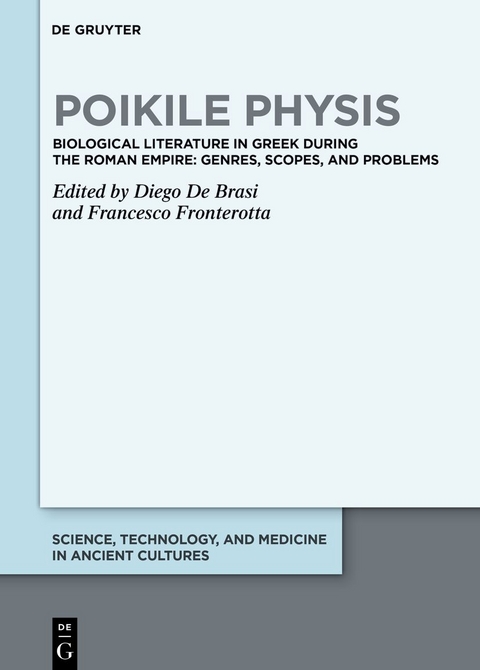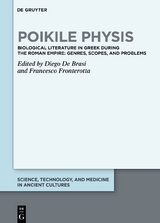Poikile Physis
Biological Literature in Greek during the Roman Empire: Genres, Scopes, and Problems
Seiten
2022
De Gruyter (Verlag)
978-3-11-079673-5 (ISBN)
De Gruyter (Verlag)
978-3-11-079673-5 (ISBN)
STMAC aims to advance an inter-disciplinary and inclusive approach to the study of science in the ancient world, ranging from mathematics and physics, medicine and magic to astronomy, astrology, and divination and covering the Mediterranean world, the Near (Middle) East, and Central and East Asia. The series is open to different types of publications including monographs and edited volumes as well as text editions and commentaries.
Biological literature of the Roman imperial period remains somehow ‘underestimated’. It is even quite difficult to speak of biological literature for this period at all: biology (apart from medicine) did not represent, indeed, a specific ‘subgenre’ of scientific literature. Nevertheless, writings as disparate as Philo of Alexandria’s Alexander, Plutarch’s De sollertia animalium or Bruta ratione uti, Aelian’s De Natura Animalium, Oppian’s Halieutika, Pseudo-Oppian’s Kynegetika, and Basil of Caeserea’s Homilies on the Creation engage with zoological, anatomic, or botanical questions. Poikile Physis examines how such writings appropriate, adapt, classify, re-elaborate and present biological knowledge which originated within the previous, mainly Aristotelian, tradition. It offers a holistic approach to these works by considering their reception of scientific material, their literary as well as rhetorical aspects, and their interaction with different socio-cultural conditions. The result of an interdisciplinary discussion among scholars of Greek studies, philosophy and history of science, the volume provides an initial analysis of forms and functions of biological literature in the imperial period.
Biological literature of the Roman imperial period remains somehow ‘underestimated’. It is even quite difficult to speak of biological literature for this period at all: biology (apart from medicine) did not represent, indeed, a specific ‘subgenre’ of scientific literature. Nevertheless, writings as disparate as Philo of Alexandria’s Alexander, Plutarch’s De sollertia animalium or Bruta ratione uti, Aelian’s De Natura Animalium, Oppian’s Halieutika, Pseudo-Oppian’s Kynegetika, and Basil of Caeserea’s Homilies on the Creation engage with zoological, anatomic, or botanical questions. Poikile Physis examines how such writings appropriate, adapt, classify, re-elaborate and present biological knowledge which originated within the previous, mainly Aristotelian, tradition. It offers a holistic approach to these works by considering their reception of scientific material, their literary as well as rhetorical aspects, and their interaction with different socio-cultural conditions. The result of an interdisciplinary discussion among scholars of Greek studies, philosophy and history of science, the volume provides an initial analysis of forms and functions of biological literature in the imperial period.
Diego De Brasi, University of Trier, Germany; Francesco Fronterotta, Sapienza University of Rome, Italy.
| Erscheinungsdatum | 03.09.2022 |
|---|---|
| Reihe/Serie | Science, Technology, and Medicine in Ancient Cultures ; 12 |
| Zusatzinfo | 1 b/w ill., 1 b/w tbl. |
| Verlagsort | Berlin/Boston |
| Sprache | englisch |
| Maße | 170 x 240 mm |
| Gewicht | 508 g |
| Themenwelt | Literatur ► Märchen / Sagen |
| Geschichte ► Allgemeine Geschichte ► Altertum / Antike | |
| Naturwissenschaften ► Biologie | |
| Sozialwissenschaften ► Pädagogik ► Allgemeines / Lexika | |
| Schlagworte | animals • Naturwissenschaft • Pflanzen • plants • rhetoric • Rhetorik • Scientific Knowledge • Tiere |
| ISBN-10 | 3-11-079673-2 / 3110796732 |
| ISBN-13 | 978-3-11-079673-5 / 9783110796735 |
| Zustand | Neuware |
| Informationen gemäß Produktsicherheitsverordnung (GPSR) | |
| Haben Sie eine Frage zum Produkt? |
Mehr entdecken
aus dem Bereich
aus dem Bereich




